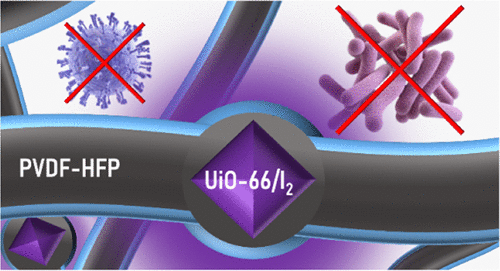
Antibacterial Nanostructured Membranes
Metal-organic frameworks, MOFs, are hybrid coordination polymers consisting of inorganic nodes linked together via organic ligands called linkers. MOFs are 3D crystalline structures with high surface area and porosity. Due to the high number of possible combinations of inorganic and organic structure elements, MOFs can have a wide range of interesting properties. Among those, MOFs can serve as carriers of other active molecules such as drugs.
In this paper, the authors focused on the MOF UiO-66 which is the carrier of iodine as a disinfectant agent. However, MOFs are usually in powder form which is inappropriate for many applications. The paper describes a new way of stabilizing MOFs by making nanostructured MOF/polymeric membranes via electrospinning. Such composite opens a broader range of MOFs potential applications. Moreover, due to the saturation of MOF with iodine, the membrane acquires antibacterial and antiviral properties after contact with wet surfaces such as skin. The nanostructured membrane with disinfection properties is a suitable material for medical applications such as the preparation of bandage textiles.
Link to the publication: K. Kiraci, D. Buzek, P. Peer, V. Liska, J. Mosinger, I. Krizova, M. Kloda, S. Ondrusova, K. Lang, and J. Demel, Polymeric membranes containing iodine-loaded UiO-66 nanoparticles as water-responsive antibacterial and antiviral surfaces. Appl. Nano Mater. 5 (2022) 1244. https://doi.org/10.1021/acsanm.1c03832